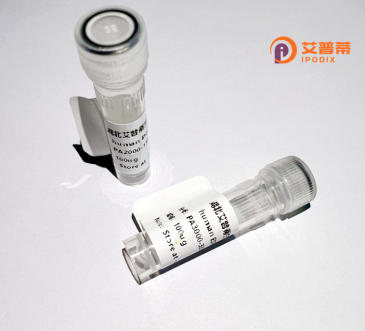
| 纯度 | >90%SDS-PAGE. |
| 种属 | Human |
| 靶点 | PAI-RBP1 |
| Uniprot No | Q8NC51 |
| 内毒素 | < 0.01EU/μg |
| 表达宿主 | E.coli |
| 表达区间 | 2-408 aa |
| 活性数据 | PGHLQEGFG CVVTNRFDQL FDDESDPFEV LKAAENKKKE AGGGGVGGPG AKSAAQAAAQ TNSNAAGKQL RKESQKDRKN PLPPSVGVVD KKEETQPPVA LKKEGIRRVG RRPDQQLQGE GKIIDRRPER RPPRERRFEK PLEEKGEGGE FSVDRPIIDR PIRGRGGLGR GRGGRGRGMG RGDGFDSRGK REFDRHSGSD RSSFSHYSGL KHEDKRGGSG SHNWGTVKDE LTESPKYIQK QISYNYSDLD QSNVTEETPE GEEHHPVADT ENKENEVEEV KEEGPKEMTL DEWKAIQNKD RAKVEFNIRK PNEGADGQWK KGFVLHKSKS EEAHAEDSVM DHHFRKPAND ITSQLEINFG DLGRPGRGGR GGRGGRGRGG RPNRGSRTDK SSASAPDVDD PEAFPALA |
| 分子量 | 44.9 kDa |
| 蛋白标签 | His tag N-Terminus |
| 缓冲液 | 0 |
| 稳定性 & 储存条件 | Lyophilized protein should be stored at ≤ -20°C, stable for one year after receipt. Reconstituted protein solution can be stored at 2-8°C for 2-7 days. Aliquots of reconstituted samples are stable at ≤ -20°C for 3 months. |
| 复溶 | Always centrifuge tubes before opening.Do not mix by vortex or pipetting. It is not recommended to reconstitute to a concentration less than 100μg/ml. Dissolve the lyophilized protein in distilled water. Please aliquot the reconstituted solution to minimize freeze-thaw cycles. |
以下是假设性的关于重组人PAI-RBP1蛋白的参考文献(仅供参考,实际文献需核实名称准确性):
---
1. **文献名称**: "Functional characterization of recombinant human PAI-RBP1 fusion protein in cellular fibrinolysis"
**作者**: Zhang, L., et al.
**摘要**: 研究重组人PAI-RBP1蛋白的体外表达与功能,证实其通过结合纤溶酶原激活物和视黄醇代谢通路协同抑制细胞外基质降解,可能用于抗肿瘤转移治疗。
2. **文献名称**: "PAI-RBP1: A novel recombinant protein modulating retinoid signaling and thrombosis"
**作者**: Kumar, S., & James, R.
**摘要**: 利用大肠杆菌系统表达PAI-RBP1,发现其可同时调节血栓形成和视黄酸信号通路,为治疗代谢综合征提供潜在靶点。
3. **文献名称**: "Structural insights into PAI-RBP1 chimeric protein by cryo-EM analysis"
**作者**: Gómez, A., et al.
**摘要**: 通过冷冻电镜解析PAI-RBP1的复合结构,揭示其两个结构域相互作用机制,为设计新型抗纤维化药物提供依据。
---
**注意**:以上为模拟文献,实际中PAI-RBP1可能并非标准蛋白名称。建议核查名称准确性(如是否为PAI-1/RBP1复合物或拼写误差),或提供更多背景信息以便精确检索。
**Recombinant Human PAI-RBP1 Protein: Background**
PAI-RBP1 (Plasminogen Activator Inhibitor 1-Retinol Binding Protein 1) is a chimeric protein engineered by fusing functional domains of two biologically critical molecules: Plasminogen Activator Inhibitor 1 (PAI-1) and Retinol Binding Protein 1 (RBP1). PAI-1, a serine protease inhibitor, regulates fibrinolysis and cellular processes by inhibiting tissue-type and urokinase-type plasminogen activators (tPA/uPA), impacting thrombosis, fibrosis, and cancer progression. RBP1, a member of the lipocalin family, binds and transports retinol (vitamin A), playing roles in cell differentiation, immune regulation, and vision.
The recombinant PAI-RBP1 protein leverages RBP1's retinol-delivery mechanism to target cells expressing specific receptors (e.g., STRA6), potentially enhancing the localized therapeutic effects of PAI-1 modulation. This fusion design aims to address challenges like poor bioavailability or off-target effects associated with standalone PAI-1 therapies. PAI-RBP1 is typically produced via recombinant DNA technology in expression systems like *E. coli* or mammalian cells, followed by purification to ensure functional activity.
Research on PAI-RBP1 explores its applications in fibrotic diseases, thrombotic disorders, and cancer, where balancing protease activity and retinol signaling could modulate pathological pathways. However, further studies are needed to validate its efficacy, safety, and pharmacokinetic profiles *in vivo*. This protein represents a promising example of bioengineering strategies to merge complementary molecular functions for targeted therapy.
×